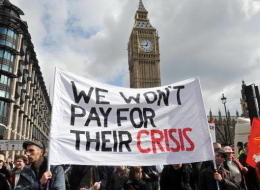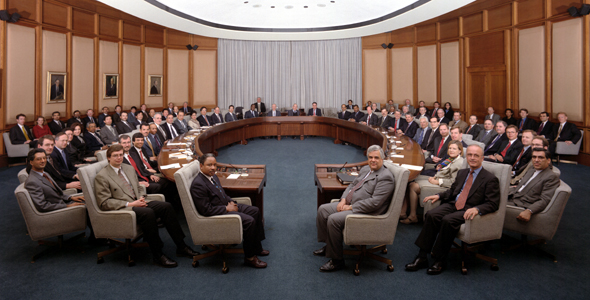
G-20 Leaders will face defiant protests in London.
Some of my colleagues and other readers of the Global Markets & Foreign Policy blog have commented recently that my posts are “alarmist” in nature, or “out of the mainstream.” Others have gone as far as saying that I’m a “radical.” That is until I bring their attention to the fact that my posts are usually a compendium of recent news items, supported by reports from sometimes stodgy, staid and mainstream sources such as the Wall Street Journal, Foreign Policy (FP) magazine or the New York Times, among others.
Case in point, last week, The Mail, a London daily, reported that British PM Gordon Brown endured a public rebuke from Brazilian President Luis “Lula” Ignacio Da Silva that it was unfair that the world’s poorest nations had to suffer the most from the greed and irresponsibility of Western bankers, and the failures of the Anglo-American, or ‘Laisse-Faire’, capitalist system.
‘This was a crisis that was fostered and boosted by irrational behaviour of people that are white, blue-eyed, that before the crisis looked like they knew everything about economics,’ he declared. ‘Now they have demonstrated that they don’t know anything about economics.’

Gordon & Lula in London Last Week
Those aren’t my words. And to further the point, today’s Sunday Times includes two interesting articles in particular: one titled, “Anglo-American Capitalism On Trial,” and the other questions the future role of the IMF as global finance trends shift from north to south as developing Markets are no longer content to become shackled in debt to creditor developed nations (think the G-8). You should read them both.
And the lead report in the ‘Washington’ section notes, among other things:
The challenges stem in part from lingering unhappiness around the world at the way the Bush administration used American power. But they have been made more intense by the sense in many capitals that the United States is no longer in any position to dictate to other nations what types of economic policies to pursue — or to impose its will more generally as it intensifies the war in Afghanistan and extracts itself from Iraq.
“There is a direct challenge under way to the paradigms that America has been trying to sell to the rest of the world,” said Eswar S. Prasad, a former China division chief at the International Monetary Fund. The American banking collapse, which precipitated the global meltdown, has led to a fundamental rethinking of the American way as a model for the rest of the world. Yet even as his presence stirs opposition to particular American policies, Mr. Obama is being welcomed by many Europeans as an embodiment of American ideals.’

IMF Board of Governors (WP)
From the New York Times – Sunday 29 March 2009:
And then there was this also from the New York Times: (Though I usually like to mix things up a bit, it seems in its final throes as a daily newsprint, the New York Times out did itself today with exceptionally insightful analysis of the full scope of issues facing the G-20 this year.)
“Just as Roosevelt and Churchill shared that bond, so, now, do Mr. Obama and Mr. Brown. Both men, reacting to events on Wall Street, in the City and in other financial centers, have spoken, with unaccustomed asperity, of the greed and irresponsibility of bankers, hedge-fund managers and others who, the two men have as much as said, have betrayed the system and come close to wrecking it.
Now, the conviction that the system must be rebuilt to curb future excesses forms a starting point for the reforms that will come under discussion in London. Like Mr. Brown’s, President Obama’s message to his own compatriots has focused on ways of revitalizing the system, often to the exasperation of those among their supporters who would favor more radical measures.
Even as both men have embarked on enormous increases in public-sector spending, they have maintained that solutions to the crisis lie in reawakening the markets and recapitalizing the banks, rather than having the government take them over, and in placing financial institutions under closer supervision rather than tearing at the system’s foundations. And both, when they respond to public anger at the private sector, have seemed more geared to managing that anger than stoking it.
And for the record. . .
I’m no radical; I just have a moral conscience, and a heart that bleeds.